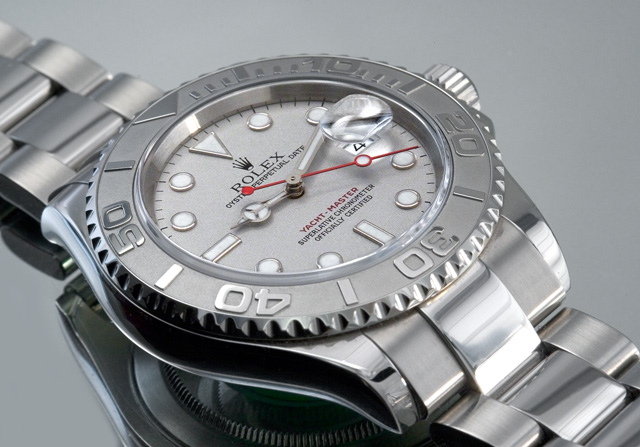
Rolex Yacht-Master Review
By: John B. Holbrook, II
June 5th, 2005
The Rolex Yacht-Master Reference 16622 is, from many perspectives, a unique and interesting Rolex. When I first saw the watch and tried it on in person, I wasn't impressed. It just didn't seem to grab me, so I never paid it too much attention for several years thereafter. It wasn't until this past year, when several of my online friends started getting the watch that I gave it a second look, and boy am I glad I did.

The Yacht-Master is one of Rolex's newer models in their line up, and was first introduced in 1992. However, it wasn't until 1997 that Rolex debuted the Rolesium (Rolex's term for a stainless steel and platinum finish) Yacht-Master, reference 16622. It was the Rolesium configuration which really has caught the public's attention, and risen sharply in popularity. While not in short of supply as the stainless steel Daytona, it would appear that demand is greater than the current supply, and the margin seems to be growing every year.
The Yacht-Master was the first Oyster Professional series watch to feature the Rolex Maxi Dial - so named due to the enlarged markers and thicker hands as compared to the standard issue Oyster Professional watch dials. In this comparison photo, you can see the difference between the markers and hands on the Yacht-Master and on the Sea-Dweller:


The extra surface area on the markers and minute hand means more luminous material can be applied, making for a brighter glow. The Yacht-Master has the best low light visibility of any Rolex I've owned. I have no problem reading the time all the way through a movie at the theater - something I've never been able to do with my other Rolexes. It's widely speculated that Rolex will eventually implement the Maxi Dial on all of the Oyster Professional watches.

The bezel and dial of the Yacht-Master really are quite stunning. The bezel and the watch dial are solid platinum. I was initially hesitant that the platinum bezel (which rotates in both directions) would easily scratch, thus far that hasn't been the case I'm also quite fond of the red second hand, and red lettering of the dial - reminiscent of the vintage red letter Submariner and Sea-Dweller. The dial is protected by a sapphire crystal.

In the above comparison picture you can also see that the Yacht-Master has more rounded, polished case and lugs than on the Sea-Dweller - the case is virtually identical to that found on the Cosmograph Daytona. The Yacht-Master bracelet also is very similar to the Daytona in that the center links are solid (not hollow like the other Oyster professional line bracelets) and has a polished finish applied. If the Yacht-Master has any short coming, it's the bracelet clasp - it's the same flip-lock clasp used on the GMT Master II and the Explorer II. I've spoken to several owners who have gone to the expense of ordering the much higher quality clasp found on the Rolex Daytona from European Rolex dealers, and attached it to the Yacht-Master (very easily done).
The Yacht-Master case is 40mm in diameter, but a shade thinner than most Oyster Professionals. The thinner case and polished surfaces give the watch a very dressy appearance - my Yacht-Master has become a favorite watch to wear with a suit. Even though the Yacht-Master has the Rolex Triplock crown, Rolex only rates the Yacht-Master for 100 meters of water resistance (compared to 300 meters for the Submariner). That water resistance rating is fine enough for a sporting watch like the Yacht-Master. It's not designed to be a diving "tool" watch like the Submariner or Sea-Dweller.
Inside the watch lies one of the Yacht-Masters strongest selling points - the Rolex caliber 3135 movement. The 3135 is a 31 jewel automatic movement that is manufactured completely in house by Rolex. Over they years, many watch manufacturers have implemented an outsourcing strategy for various components of their watches and movements to attain manufacturing efficiency and cost reduction. However, despite the higher cost in inherent inefficiency of doing so, Rolex has always sought to completely control all aspects of the design and manufacturing by keeping it under their own roof. While the cost/benefit of an in house strategy can be debated, the success of the 3135 is undeniable.

The current 3135 caliber in the Yacht-Master has been in service since 1989. In those 16 years of services, the 3135 has garnered a reputation as being one of the most reliable, and robust movements ever created. The movement has been criticized at times for lacking refinement and technological sophistication. I would argue that it was designed from the beginning as a movement to be encased in a stainless steel Oyster case, and endure rigorous conditions and treacherous environments. It's a clear case of function over form. I would also argue that the 3135 isn't lacking in technological sophistication - Rolex Research and Development is second to none. Rolex has implemented several, truly notable features into the 3135, such as a Breguet overcoil balance-spring, and the Microstella adjustment screws, and Kif shock absorption. In short, it's hard to criticize Rolex for setting the benchmark which other manufactures strive to attain. The 3135 in the Yacht-Master is of course COSC certified.
The Yacht-Master has quickly become a mainstay in my collection of watches, and I'm really surprised that I didn't get this watch sooner. It easily dresses up or down, and the color of the platinum dial blends easily with nearly all choices of wardrobe. Unfortunately, the watch has a very high retail price - $7,800.00 - that's higher than the stainless Daytona or the two-tone Submariner. On the plus side though, the Yacht-Master is one of Rolex's very best designed and most exclusive models, with the enhanced dial, bracelet, and precious metals used its construction.
